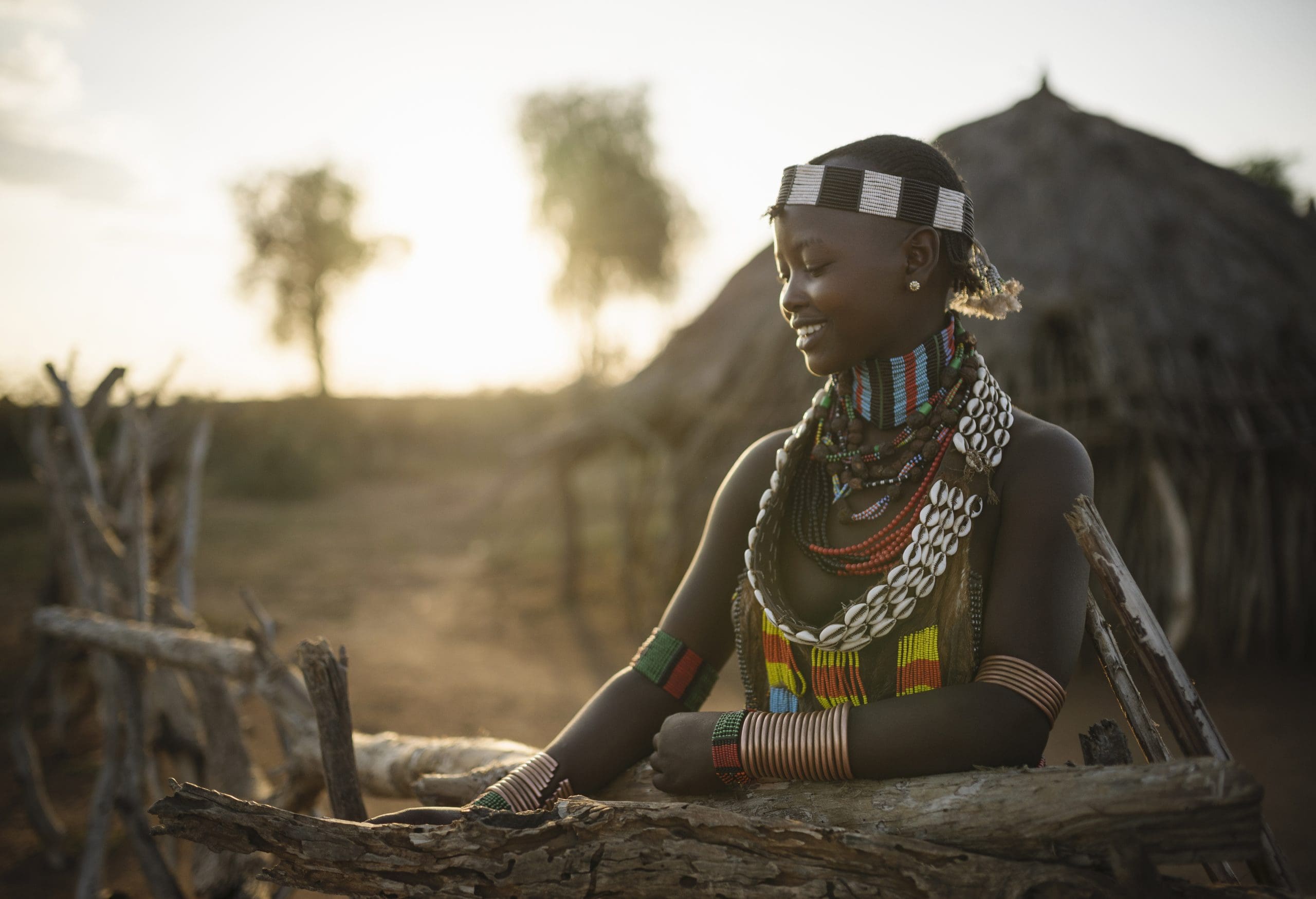Africa is a land of breathtaking diversity, where centuries-old traditions and vibrant cultures come alive through its many tribes. Each tribe tells a unique story, offering a glimpse into the continent’s rich heritage and the deep connection between people and their land. With The Mara Wanderlust, you have the opportunity to immerse yourself in these fascinating cultures, experiencing firsthand the rituals, traditions, and way of life that define Africa’s heart and soul. This guide takes you on a journey to explore some of the continent’s most iconic tribes, helping you uncover their heritage and gain a deeper appreciation for their enduring traditions.
Spotlight on Key African Tribes
Africa’s tribes are as diverse as its landscapes, each offering a unique window into the continent’s cultural and historical richness. Here, we spotlight four iconic tribes, exploring their traditions, lifestyles, and the deep connections they maintain with their environments.
1. The Maasai Tribe (Kenya and Tanzania)
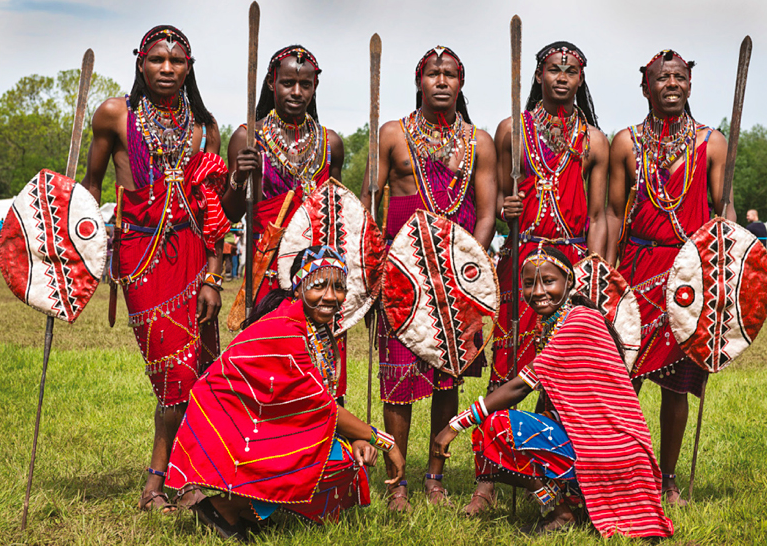
The Maasai, one of Africa’s most recognized tribes, are deeply intertwined with the Masai Mara and Serengeti ecosystems. Known for their vibrant red shukas (cloth wraps) and intricate beadwork, the Maasai express their identity through their attire and adornments.
Their traditions include age-old warrior ceremonies such as the Eunoto, which marks the transition to adulthood, and the famous jumping dance (Adumu), a display of strength and vitality. Storytelling is central to Maasai life, preserving history and values while fostering community bonds. Visiting their villages offers a profound insight into their harmonious coexistence with the land and wildlife.
2. The Zulu Tribe (South Africa)
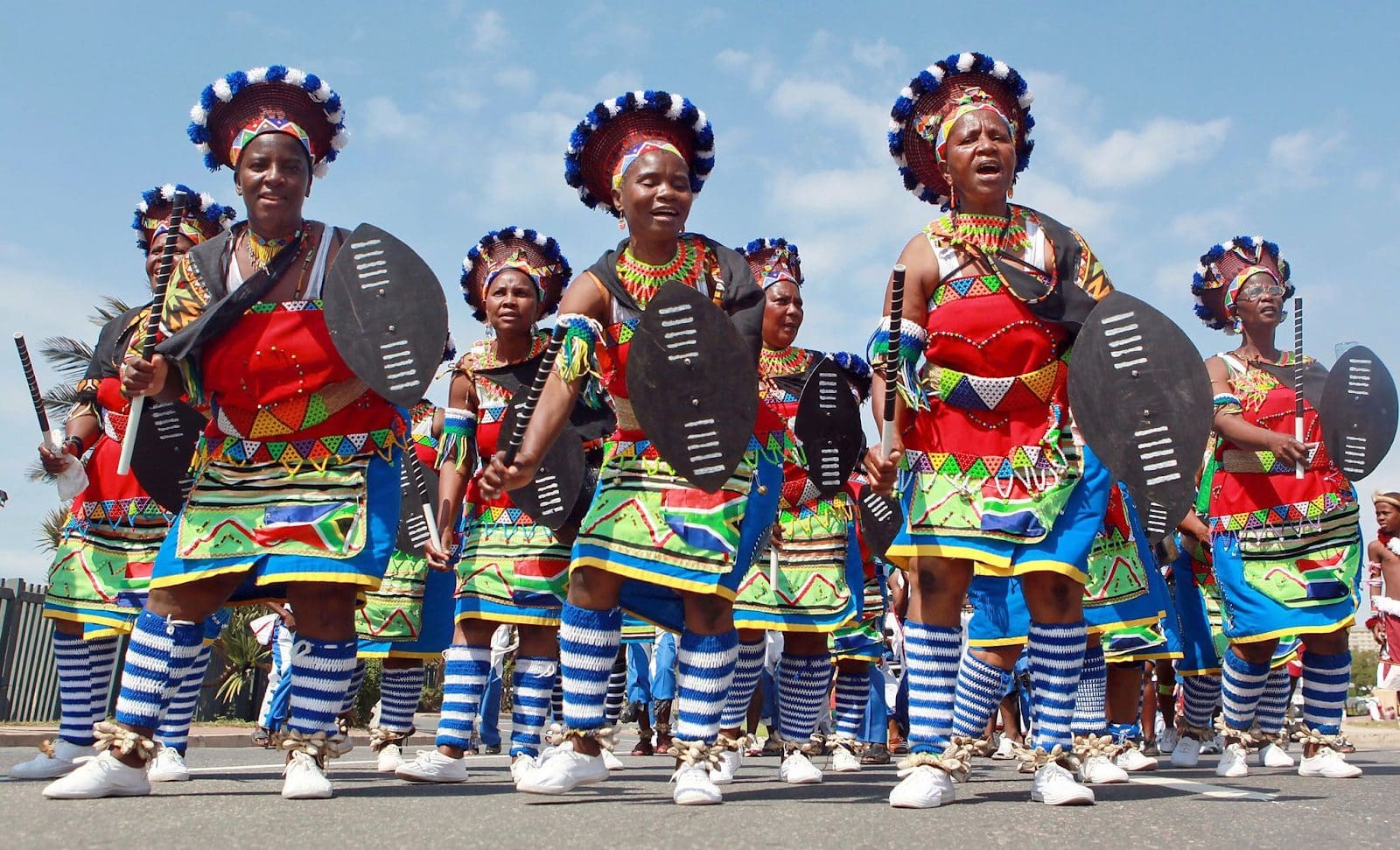
The Zulu people are renowned for their proud warrior history, famously led by King Shaka Zulu, whose strategies reshaped African warfare. Today, the Zulu maintain a dynamic blend of traditional and modern lifestyles, with cultural festivals like the Reed Dance showcasing their heritage.
Music and dance play a pivotal role in Zulu culture, often used to celebrate milestones, tell stories, or honor ancestors. The rhythmic beat of drums, paired with energetic dances, creates a powerful connection to their history, leaving visitors inspired by their resilience and vibrancy.
3. The Himba Tribe (Namibia)
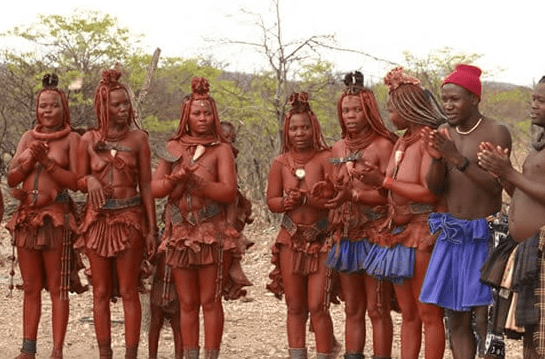
The Himba, a semi-nomadic tribe from Namibia, are celebrated for their striking red ochre-covered skin and hair, a tradition that protects them from the sun and symbolizes beauty. Living in the harsh Namib Desert, they have mastered sustainable living through cattle herding and water conservation techniques.
Their villages are a testament to adaptability and resourcefulness, with visitors often mesmerized by their jewelry, hairstyles, and rituals that honor their ancestors. The Himba’s connection to the land highlights the beauty of living in harmony with nature.
4. The San People (Botswana and Namibia)
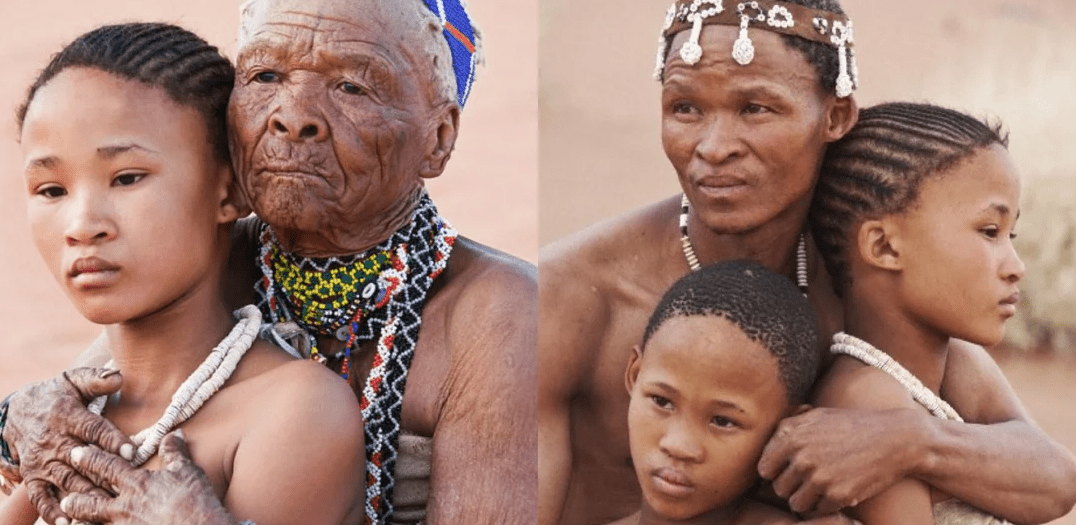
The San, or Bushmen, are Africa’s oldest known inhabitants, with a history that dates back tens of thousands of years. They are master hunter-gatherers, using an intimate knowledge of the Kalahari Desert to find food and water in one of the world’s most challenging environments.
Their rock art, found in caves and shelters, provides a glimpse into their spiritual beliefs and daily life. Visitors can learn from the San’s deep ecological wisdom and survival skills, gaining an appreciation for their remarkable adaptability and respect for nature.
The Connection Between African Tribes and Nature
African tribes have long lived in harmony with nature, drawing on generations of ecological knowledge to thrive in diverse and often challenging environments. Their traditions and stories showcase a deep respect for the natural world, offering lessons that remain relevant today.
1. Harmonious Coexistence with the Environment
The Maasai, San, and Himba tribes exemplify sustainable living, using natural resources without depleting them. The Maasai manage livestock to coexist with wildlife, while the San rely on their profound understanding of desert ecosystems to find water and food. Similarly, the Himba maintain practices that preserve the fragile balance of their desert habitat.
2. Traditional Ecological Knowledge in Modern Times
These tribes’ knowledge of plants, weather patterns, and wildlife behaviors is invaluable in addressing modern environmental challenges like climate change. Their sustainable practices inspire conservation efforts worldwide, emphasizing the importance of indigenous wisdom.
3. Storytelling as a Preservation Tool
Storytelling plays a pivotal role in passing ecological knowledge to future generations. For example, Maasai tales often include lessons about wildlife conservation, while San rock art tells stories of their symbiotic relationship with the Kalahari Desert.
Experiencing Tribal Culture with The Mara Wanderlust
The Mara Wanderlust offers a unique opportunity to immerse yourself in Africa’s vibrant tribal cultures. Through carefully curated tours, travelers can engage with communities, participate in traditions, and gain a deeper appreciation for these rich heritages.
1. Tailored Cultural Experiences
Each tour is designed to provide authentic encounters with tribal life. Whether visiting a Maasai village or learning traditional crafts from the Himba, you’ll witness cultural practices that have endured for centuries.
2. Interactive Opportunities with Tribal Communities
Travelers can join in ceremonies, such as Maasai dances or San bushwalks, gaining firsthand insight into their customs. These interactions foster meaningful connections and a deeper understanding of tribal life.
3. Emphasizing Ethical Tourism
The Mara Wanderlust is committed to ethical tourism that respects tribal privacy and traditions. By supporting local communities, these tours contribute to preserving cultural heritage while ensuring visitors engage in respectful and enriching experiences.
Why Choose The Mara Wanderlust for Cultural Exploration?
The Mara Wanderlust is your trusted partner for meaningful and respectful cultural experiences. With their expertise, travelers gain authentic insights into Africa’s tribal heritage while contributing to sustainable tourism.
1. Expertise in Authentic Cultural Experiences
The Mara Wanderlust specializes in creating immersive tours that honor the traditions and lifestyles of Africa’s tribes. Their itineraries focus on genuine connections, not staged performances, ensuring travelers experience true cultural authenticity.
2. Skilled Guides with Tribal Insights
Their guides are knowledgeable and passionate about African heritage, offering deep insights into the history, customs, and significance of the tribes you visit. This enriches your journey with meaningful context.
3. Commitment to Sustainable Tourism
The Mara Wanderlust prioritizes ethical tourism, partnering with local communities to support their economies and preserve their cultural identities. By choosing them, you help sustain tribal traditions for generations to come.
Tips for Travelers Exploring African Tribes
Preparing for a tribal cultural experience ensures you approach it with respect and understanding. Here’s how you can make the most of your journey while honoring local traditions.
1. Approach Experiences with Respect and Openness
Be curious yet considerate. Listen, observe, and ask questions respectfully to build genuine connections and learn from the communities you visit.
2. Dress and Act Appropriately
Wear modest and practical attire suited to the local culture and climate. Follow guidance from your hosts regarding behavior, and avoid actions that may be seen as disrespectful.
3. Photography Etiquette
Always ask permission before taking photos of people, ceremonies, or private spaces. Many tribes value privacy, and showing respect can enhance your experience.
4. Essential Items to Pack
Bring items such as comfortable walking shoes, sun protection, reusable water bottles, and a notebook to document your experiences. Avoid single-use plastics to minimize environmental impact.
Preserving Tribal Heritage: A Shared Responsibility
Supporting the preservation of tribal cultures is crucial in a world that increasingly values modernization over tradition. Tourism plays a pivotal role in safeguarding these unique heritages.
1. Supporting Local Communities
When you visit tribal areas, your participation directly benefits their economies. Purchases of local crafts, donations, and ethical tourism practices help sustain their way of life.
2. Tourism as a Tool for Preservation
Ethical tourism fosters cultural pride and awareness, encouraging tribes to preserve their traditions. When done responsibly, it becomes a vital force for cultural sustainability.
3. Travelers as Cultural Ambassadors
Your respect for tribal customs and your willingness to share their stories with others promotes appreciation and understanding worldwide. This collective effort ensures these cultures continue to thrive.
Conclusion: Embrace the Spirit of Africa
African tribal cultures offer a window into the continent’s unparalleled richness and diversity, where history, tradition, and nature blend seamlessly. From the vibrant Maasai ceremonies to the wisdom of the San, every tribe tells a story that connects us to humanity’s roots. With The Mara Wanderlust, you can embark on a transformative journey that not only deepens your understanding of these cultures but also contributes to their preservation. Ready to experience the heart of Africa? Book your cultural adventure today and let The Mara Wanderlust guide you through an unforgettable exploration of Africa’s tribes.
FAQs
What are the most famous African tribes to visit?
Some of the most famous African tribes include the Maasai of Kenya and Tanzania, the Himba of Namibia, the Zulu of South Africa, and the San people of Botswana. Each offers unique traditions and fascinating cultural experiences.
How can I ensure I respect tribal customs and traditions during my visit?
Respect customs by dressing modestly, asking permission before taking photos, and following your guide’s advice. Approach interactions with curiosity and humility, being mindful of personal boundaries and cultural sensitivities to foster meaningful and respectful connections.
What is unique about the Maasai culture?
The Maasai are known for their vibrant red attire, intricate beadwork, and unique jumping dance (Adumu). Their deep connection to nature, warrior traditions, and storytelling practices reflect a harmonious balance between heritage and their environment.
Are these tours safe for solo travelers and families?
Yes, tours with The Mara Wanderlust prioritize safety for all travelers, including solo adventurers and families. Professional guides, secure itineraries, and well-planned logistics ensure an enriching and worry-free experience for everyone.
How does The Mara Wanderlust support tribal communities?
The Mara Wanderlust partners with local communities to promote sustainable tourism. By creating opportunities for economic growth, supporting cultural preservation, and ensuring ethical practices, they help tribes maintain their heritage while benefiting from tourism.

